Mango is a highly popular tropical fruit, even earning the nickname “king of fruits”. And research is showing that this nickname could just as easily refer to the fantastic benefits of mangoes as it could to the delicious flavor.
Mangoes are without a doubt one of the most nutritious whole foods, particularly where vitamins are concerned. They also double as both an incredibly healthy food and a fantastic skincare product (in the form of mango butter).
Be warned: After reading just how many benefits studies have uncovered on mango, you may feel inclined to consume more of this fantastic fruit.
The Background on Mangoes: A Tropical Powerhouse
Mango trees go by the botanical name of Mangifera indica and are native to India and Southeast Asia. If you want to get technical about it, the fruits are known as drupes because they have a pit or stone in the center. (Cherries, plums, peaches, and coconuts are also drupes.)
Experts believe that mangoes have been cultivated for at least 4000 years. At some point, mango seeds were taken to areas outside their native land, and the trees now grow in many tropical and sub-tropical locations.
There are hundreds of varieties of mangoes, though only one or two typically show up in grocery stores outside the tropics. They can have green, red, orange, or yellow skin but typically share the same golden-yellow flesh.
In several countries (India, Bangladesh, and Pakistan to name a few), both mango fruit and mango leaves are used as part of religious ceremonies, weddings, and festivals. The mango tree is frequently mentioned in eastern mythology and is connected to sacred rituals.
Mangoes have also long had value in traditional medicine.
They are considered a nourishing food that brings moisture to the body in Ayurvedic medicine. In traditional Chinese medicine, mangoes are strengthening for the digestion, replenish fluids, and help nourish qi.
Top Benefits of Mangoes for Health
Very Rich in Nutrients
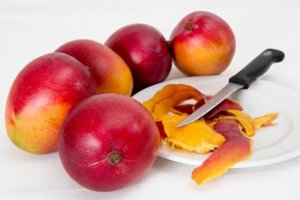
Mangoes are rich in several important vitamins and minerals.
Perhaps of most note is their vitamin C content— about 67% of the daily value in just one cup of fresh mango.
That same cup of mango also contains 10% of the DV for vitamin A, 10% of the DV for vitamin E, and 6% of the DV for vitamin K. Plus, you’ll get about 18% of the DV for folate (vitamin B9) and 12% of the DV for vitamin B6 as well as smaller amounts of other B vitamins.
To add to this excellent vitamin content are a range of minerals, including copper, potassium, and magnesium. Mangoes also contain a good amount of fiber— about 2.6 grams per cup.
Packed with Anti-Aging Antioxidants
Along with tons of nutrients, mangoes are also extremely rich in antioxidants. The flesh, peel, and even the kernel are packed full of a specific group of antioxidants known as polyphenols.
Polyphenols in general have powerful protective properties for the human body. The fight free radicals, which contribute to aging and age-related diseases, at the cellular level. This means they may help protect you from cancer, heart disease, and other chronic conditions.
Some of the specific polyphenols in mangoes— like mangiferin— have been confirmed to powerfully counteract free radical damage and may help fend off certain diseases.
There’s no doubt that this high antioxidant content is a key factor in many of the benefits of mangoes.
Strengthens Immune Function
It should come as no surprise that mangoes are good for immune health given their high vitamin C content.
Vitamin C is one of the top nutrients for your immune system. It encourages the production of certain white blood cells that fight off infection. Studies also indicate that it may shorten the duration of the common cold and lessen the severity of respiratory illnesses.
Vitamin A, which mangoes are also rich in, is essential for proper immune function as well. Not getting enough of it could open you up to a greater risk of infection.
With the addition of other immune-boosting nutrients like copper, B vitamins, and antioxidants, mangoes are definitely a great immune-boosting food.
May Be Beneficial for Blood Sugar (and Diabetes)

Like most other fruits, mangoes are fairly high in sugar. In fact, a one cup serving of fresh mango contains about 22 grams of it.
In spite of this, there’s evidence that there may actually be benefits of mangoes when it comes to blood sugar.
Many studies have already linked a higher intake of fresh fruit with a lower risk of type 2 diabetes. This indicates that the sugar in raw fruit does not have the same impact on blood sugar that processed sugar does.
One study even found that consuming freeze-dried mango daily for 12 weeks improved blood sugar levels. Others have shown that consuming foods high in vitamin C (like mango) may help prevent diabetes.
There haven’t been enough studies conducted yet for “conclusive” findings, but the results so far show very positive effects of mango on blood sugar levels.
Excellent for Digestion
Mango has more than one benefit for your digestion. At the top of the list is a decent fiber content— perhaps the best substance for promoting regularity that most people don’t get enough of.
Interestingly, one study found that consuming mango daily was more effective for chronic constipation than a supplement made only of a similar amount of fiber. This could be because the fruit also has a high water content and/or other helpful compounds.
Along with fiber, mangoes also contain a digestive enzyme known as amylase. Amylase helps to break down complex carbohydrates and starches into sugars that are more easily absorbed by your body.
Both the dietary fiber and the polyphenols in mango also act as a prebiotic. This means the fruit helps feed the good bacteria in your gut, which is an outstanding property for overall digestion.
Potentially Fights Various Types of Cancer
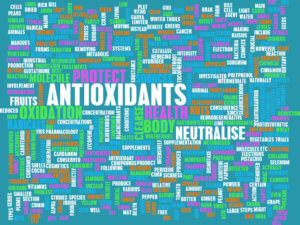
Because it’s filled with powerful antioxidants, there may be benefits of mangoes for fighting or preventing cancer. Damage from free radicals (known as oxidative stress) is linked to many types of cancer and is something that polyphenols are specifically known to combat.
In fact, mango polyphenols have already been shown to destroy or inhibit various types of cancer cells in lab studies. This includes leukemia, lung, colon, breast, and prostate cancer cells. Animal studies so far have confirmed these effects, although human studies and clinical trials are still lacking.
Other Benefits of Mangoes
When it comes to eating fresh mango, there are almost too many health benefits to list. Here’s a quick look at a few others that deserve at least a mention.
Good for Heart Health— Evidence of mango’s heart-supportive properties keeps accumulating. So far, studies have shown that the antioxidant mangiferin is incredibly protective of the human heart and may lower inflammation and fight oxidative stress in heart cells. It may also help to lower triglyceride levels.
May Support Eye Health— Mangoes are full of vitamin A (in the form of beta-carotene) and the carotenoids lutein and zeaxanthin. All of these nutrient antioxidants are supportive of eye health. Lutein and zeaxanthin are particularly concentrated in the retina and may help protect your eyes from the harmful effects of blue light.
Boosts Cognitive Function— Mangoes contain a good amount of vitamin B6, a very underrated vitamin for brain health. Studies have linked an insufficiency of vitamin B6 to a greater risk of cognitive decline and Alzheimer’s disease. The polyphenols in mango may also possess neuroprotective properties.
May Support Bone Health— Vitamin K is very important for bone-building and bone density. It appears to work together with vitamin D to increase bone mineral density and may also have a positive effect on calcium absorption. One cup of mango provides about 6% of the DV of this vital nutrient.
Of course, mangoes also have some incredible skincare benefits, which are coming up shortly.
Bonus: How to Cut a Mango
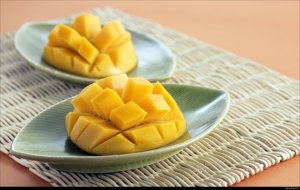
Before we get into the skin benefits of mango, here’s a question many people have: How do you properly cut a mango?
Mangoes can be quite tricky to cut due to their large pit or kernel. To make sure you can easily get the full health-boosting power of fresh mango, here’s a simple and effective way to dice (or slice) this fruit:
- Start by slicing off a small section at the top or bottom of your mango. Then, stand it up with the cut side down to help prevent it from sliding all over.
- Cut vertically along both sides of the pit so that you end up with two oval-shaped halves. (These are sometimes called the “cheeks” of the mango.)
- Take one half and score the flesh with your knife in vertical and horizontal rows to create cubes, or just cut in one direction to make slices.
- Scoop out the cubed or sliced mango flesh with a spoon. Or push on the back of the mango skin until you flip it inside-out and pop off the flesh. Repeat with the other half.
Outstanding Benefits of Mangoes for Skin
Eating mangoes provides your body with good amounts of vitamin C and vitamin A— two excellent skin-boosting nutrients. Applying it to your skin topically in the form of mango better is even better for your complexion.
Mango butter (also called mango seed butter) is made by pressing the kernel of the fruit . The end result is a skin-soothing “butter” (technically an oil that is solid at room temperature) that is creamy white with little to no scent.
Here’s more about what mango butter specifically can do for your skin.
Nourishes and Hydrates
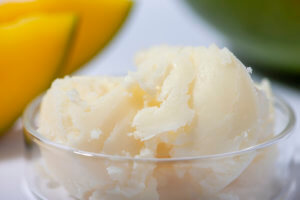
Like the rest of the fruit, the mango kernel is filled with antioxidants and nutrients. This means that mango seed butter “feeds” your skin nourishing vitamins like vitamin A, vitamin C, and vitamin E whenever you apply it.
Mango seed butter also has the addition of fatty acids like oleic acid, stearic acid, palmitic acid, and linoleic acid. This fatty acid combination deeply hydrates skin and helps to seal in moisture. The fatty acids also fill in the gaps that are present with dry, flaky skin, leaving it looking smooth and well-moisturized.
Notably, despite the deep moisturizing properties of mango butter, it’s still considered noncomedogenic. This means it won’t clog pores— and it doesn’t feel greasy or heavy, either.
Boosts Collagen for Younger-Looking Skin
Collagen is one of the most important anti-aging skin proteins. It helps to keep your skin plump and thick, which fends off wrinkles and fine lines. Unfortunately, collagen production declines as you age, which is one of the reasons signs of aging start appearing.
Vitamin C is one of the best natural collagen boosters, which means there are huge benefits of mangoes for younger-looking skin.
In short, applying vitamin C rich mango butter to your skin promotes collagen synthesis and also helps to fade the appearance of dark spots and inflammation. The result is a rejuvenated complexion that looks youthful and healthy.
Fights Signs of Aging with Natural Vitamin A
Boosting collagen with vitamin C is key to fending off signs of aging, but the vitamin A in mango butter adds even more power.
Vitamin A is most familiar in skincare under the name of retinol or retinoids (synthetic or animal-derived forms of the vitamin). Retinol has several documented anti-aging effects, like diminishing wrinkles, dark spots, etc. and improving skin tone. However, it also has major downsides, including being harsh on the skin.
The vitamin A in mango butter is in the completely natural form of beta-carotene. Beta-carotene still fights signs of aging but without the negative side effects of retinol.
Protects Skin & Promotes Skin Repair

Antioxidants like vitamin C, vitamin A, and vitamin E (all present in mango butter) don’t just fight existing signs of aging. They also help to protect your skin from UV damage that may cause more signs of aging to appear.
Neutralizing free radicals is another key way antioxidants protect your skin. Free radicals can damage important skin cells and proteins and also contribute to the breakdown of collagen and elastin. Topically applied antioxidants have been shown to combat this skin aging process.
In addition to protecting your skin, mango butter has also shown an ability to help cracked and worn skin heal. Apply it to damaged, irritated, and/or dry skin for instant soothing power and speedy skin repair.
What to Look for When Buying Mango Seed Butter
If you want to get the full benefits of mangoes for skin, buying high-quality mango seed butter is key.
The first thing to look for in mango butter is a cold-pressed and unrefined option. This means that neither heat nor chemicals have been used on the butter during extraction or processing. The butter should still have a creamy or yellow tint to it (bleached mango butter is all white).
Also, look for mango butter that is USDA Certified Organic. This ensures that no toxic chemicals were used on the mango trees or added to the product during manufacturing.
To use pure mango butter, just put a small amount in your hand. Once it touches your skin, the butter will quickly warm and turn liquid. You can then apply it to the desired area of skin.
Of course, you can also get the anti-aging benefits of mango butter as part of a quality skincare product…
Mango Seed Butter for Younger-Looking Skin
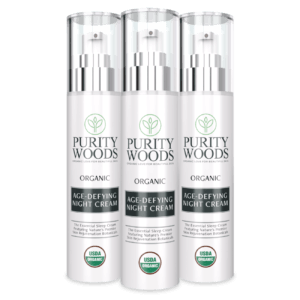
If you are searching for an outstanding solution for younger-looking skin that provides you mango seed butter and nature’s other most powerful ingredients, look into the Age-Defying Night Cream from Purity Woods.
(Click above to see the special today — up to 37% off, free U.S. shipping & free reusable makeup remover pads ($28 value) as a gift with your order!)
In addition to the mango seed butter, the Age-Defying Night Cream provides you powerful and unique ingredients — such as organic maple leaf extracts, organic Japanese knotweed extract (very high in resveratrol), rosehip seed oil, and turkey tail mushroom extract — that erase signs of aging like nothing else out there (wrinkles, crow’s feet, dark spots, etc.)
The entire formula is USDA Certified Organic, so you don’t need to worry about synthetic chemicals, GMOs, or any harmful ingredients. It’s specifically designed to work deep within your skin as you sleep (during your body’s natural repair cycle).
Learn more about the Age-Defying Night Cream here — be sure to see today’s special including up to 37% off, free U.S. shipping, and your free reusable makeup pads gift — and whatever you choose, don’t forget to add mangoes to your diet regularly!


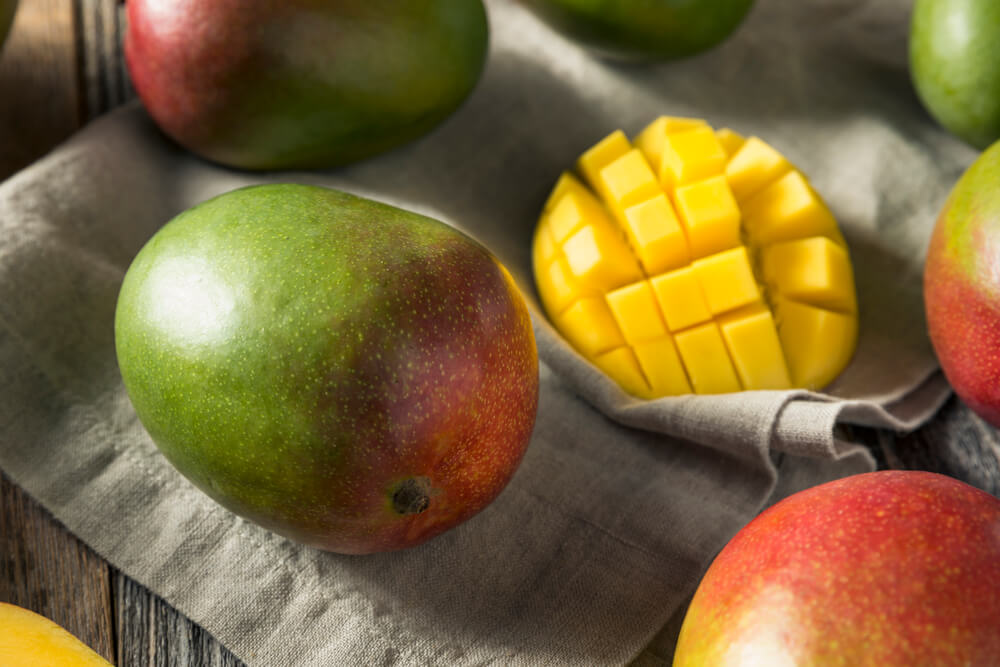
Wow, I didn’t realize how important they are. Yesterday I had let one get orange and ate one little slice. I will definitely share this information with my daughter, who turned 60 today. Thank you.
Thanks for the tip on the mango seed. We go through a few every week and I never knew about the benefits of the seed. I will be making some new cream for myself.
What about avocados?
How do you plan on extracting the butter from the seed? I would like to try but not sure how to go about that. Also, avocados are super healthy too though I don’t have all the statistics…
https://allnaturalfreespirit.com/how-to-make-mango-butter-from-seed/
Great info! And I just thought they were great tasting, haven’t met anyone that doesn’t like them. My mango trees are taking this year off, after a record crop last year. Lots in the stores though. Benefits of living in the Caribbean.
Thanks for the informations i really enjoyed it especially when talked about high sugar level
Thank you so much for this excellent information about the benefits of mangoes. I eat several slices of organic dried mango every day, and I also second-ferment cut mango in kefir (which I make). It’s very reassuring to know about the benefits of this fruit, especially since I’m quite elderly and need all the nutritional help I can get!
March 26, 2022
Sir:
Thank you very much for this article on the quality of fruit that mango is. I never had the
slightest idea that mango is so powerful on vitamins and minerals. Once again many thanks
for this article.
Regards,
Julio Curiel
thank you for sharing this very informative artikel.i am out to bye some.
Thanks Brian! I now have 11 more reasons to Love Mangoes! I never heard of Mango Butter before, I’ll have to find some and give it a try on my old skin. I just wish they grew in Northern California!
Have been drinking daily Mango juice since diagnosed with chronic kidney disease three years ago, and am now 91 years old. I surprise people with my age, as I seem to have less wrinkles than others my age. I saw it on the foods good for kidneys list when first diagnosed, and love it. I also use Purity Woods products, which work extremely well on keeping the skin smooth.
Wonderful article,delicious fruit
Very helpful. Is it safe to eat every day? Thanks for the info. It was all news to me.
Interesting. I have relocated from the UK to a Caribbean island where mangoes are everywhere which way you go.
I do all sorts with it. Smoothies, drinks, ice cream, cakes etc.
However, it breaks my heart to see the wastage.
As a result of the size and socio-economics of our ‘poor island’, our government do not have the vision to see the health as well as revenue benefits of creating resources that would enable mangoes to be an important economic means to development/ sustainability locally as well as importing it internationally. Nonetheless, the locals do relish our various variety of sun-induced mangoes.
I’ve beet eating a couple of slices of dried mangoes each morning while preparing my breakfast, not knowing about how good they are for you. I just love the flavor and texture. My grocery store sells them in a 4 gallon covered container and you can select how many you want. Now I’ll double my order. My breakfast usually contains a bowel of oatmeal with 2 prunes, 2 dates 2 spoons of raisins and 2 rounded spoons of frozen blueberries stirred into the oatmeal.with milk
Very good article, full of information.
thanks again for providing this information
Wow! I never knew that mangoes were sooooooo good for me and everyone! Funnily enough my husband and I shared one yesterday. I will definitely be buying more. Thank you for the info, Brian.
Just more good reasons to tango with a mango! lol
Thanks for these informations
Never knew our common mango was soo important, especially for people having Diabetes or Kidney disease.The other uses for the skin is great. Guess the parrots, squirrels and other animals know the benefits, as they are on my trees daily.Will continue to enjoy their benefits. Much thanks.
Thank you for this information I live in Trinidad we have a variety of mangoes here, but never knew d benefits of it, thanks again.
I always enjoy your healthful articles that dig deep into the details of our familiar herbs, veggies, and fruit. With increased awareness I have so much more appreciation for all the foods available to us and appreciation for the farmers and orchardists we depend upon.
I eat some mango everyday. I enjoyed your article. I have read that mangoes are good to keep blood pressure in range. The best thing is that mangoes are delicious!
Thank you for the information. What this mango butter help my eczema? Thank you Brian.
This is truly an absolute eye opener, thank you so much. As i suffer quite a bit with my kidneys i would appreciate to hear about any health benefits of mangos for the kidneys. Thank you, much appreciated.
I am definitely a mango fan; thanks for the info!
Really Great info. I am looking to buy some Mangoes ASAP . I live in Guelph ONT.
Thanks for this, Brian! I’ll never look at (or eat) a mango the same way again. I try to eat one every other day…great on top of organic yogurt with applesauce and wild blueberries. Glad to see they have polyphenols and K. Can you give the “core” to wildlife? How do you make mango butter out of it??
Not only are they good for you, but mangoes are also delicious!
A French priest who first tasted a mango described it best to me.
He said they taste like “a kiss from God!”
This article is so full of great information! I know how good a fresh mango is, but all of the benefits is worth every bite! Thank you so much for sharing your knowledge and reinforcing my healthy habits.
Thanks from me.
A smile for you…
When is a door not a door?
When it’s a jar
Eva in Alberta
Fascinating article.
I AM ASTONISHED TO KNOW THAT MANGOES ARE SO BENEFICIAL.I ALWAYS LOVE TO EAT MANGOES.SOMETIME I EAT 2 OR 3 FOR A FULL MEAL, ESPECIALLY THE GRAFTED ONES.
hi,somebody knows how to do the butter from the seed at home?thank you Brian for the article and all the info you give us!!!☀☀☀
Very interesting article after I made a Thai Mango Peanut salad for a family gathering yesterday. I had no idea how good Mangos are for you and I get this article today. The family loved the salad and my daughter in law who doesn’t like mangos generally, loved the salad.
Thank you for that wonderful article. I usually buy frozen mango for smoothies. I am definitely going to buy the fresh ones now. I had no idea one fruit could have so many good qualities. Thanks again.
It was very interesting to learn more about mangoes! One bit of warning, though, about the skins/peels: When I was 15, we moved to Maui and rented a house with 5 mango trees. My mother happily cut up a bunch of them to make chutney and jam, and in the process, she ate them too. She soon had what looked like a rash from poison oak on her face and hands! It turned out to be a reaction to the skin of the mango, and locals call it “mango crud,” since it is so common there. She was a fair-skinned redhead of German descent, and was extremely allergic to poison oak. She could eat the flesh with no problem, but had to wear rubber gloves to handle and peel them. The mangoes had a sticky green skin with a red blush.
I am not surprised as some people are allergic to mango. When I was living in Australia, my best friend’s elder son could not even touch a mango without getting a rash. I felt so sorry for him as I absolutely love mango and if I had any reaction to it, or many other types of food that I love eating, I would be devastated!
WE ENJOY MANGOS, BUT HAD NO IDEA JUST HOW WHOLESOME THEY WERE.
You note that mangoes have vitamin K and that K is good for bone health. I’ve read that it’s more vitamin K2 that is good for bone health, not so much for K1. Mangoes have K1, not K2. Also K1 is not recommended for folks on blood thinners. Otherwise, lots of good information!
Thanks Brian for all you do for us to be healthier. I am looking for anti-inflammatory foods to help with my sciatica, brusitus & arthritis. Also, I am interested in anything to help with keeping my blood sugar, pressure, A1c, LDL & cholesterol lower. Any info. you have on all of this would be WELCOMED for sure!!!! Wish there was a chart we could live by. Happy & Healthy New Year.
Tank you for this informative article. I have been eating mangoes for many years, and it is my absolute favourite of all fruit there is. I was lucky to live in many parts of the world and tried just about any food you can imagine. I love all fruit, but mango, for me, tops it all! I knew it had many properties, but now I know more and I cannot wait for it to come into season in January, so I can eat again one or more every day all the way until September…Some people told me that it could be fattening due to its high content of fructose…What? I don’t know what fat is as I have been slim all my life, never been on any diet, I eat very healthy and good food, exercise, walk with my dogs around 5 km every day, still work part-time, and at almost 69 I am still very energetic and fit as a fiddle! Now I am going to look for that magical mango seed butter. Thank you again and God bless!
I have heard that they also boost serotonin levels as they contain anti depressant compounds too. Surprised there was no mention of this. I like to eat foods that give a psychological boost. Apparently a handful of cashews a day is as ‘antidepressing’ as a dose of prozac!
wow, being an Ostomate, I have been eating mango to help with the digestive system, which helps alot but didn’t know it has alot more reasons and uses. Thanks so much for all the valuable information.
I call Mango’s nectar of the gods
Thanks Brian! We eat a lot of mangoes, but who knew??
Great and useful info.
June
my comments are in syn-tony with all the comments mentioned, and my gratitude is immense for all your most valuable information Brian, this article is a MUST SAVE !
I LOVE MANGOS!! Have been eating lots of them in anything I can find them in. Make smoothies, eat them in a hot sauce as the sweetness cools the heat. Very informative article. Didn’t know all that much about them except that I loved them. I have had several people telling me that I look younger and that amazed me. Maybe my crave for mangos has helped without me knowing it. Don’t know, but have been working to reach my goal of living to a very ripe age: 100+ for my girls and grandchildren who only have me left as a grandparent. I’m 79 now and feeling pretty good. Working hard at being healthy and feeling better. Thank you for this article. Very excellent!
Do frozen mangos provide the same benefits?
Hi Linda, sure do — in fact, see https://theartofantiaging.com/7-best-fruits-to-buy-frozen-not-fresh/
Many thanks Brian for sharing the informative article on the multiple benefits of Mangoes.Learnt a lot – especially about Mango.Seed Butter.